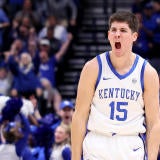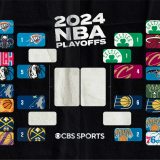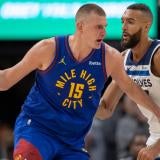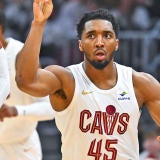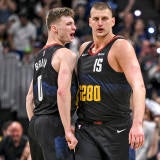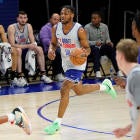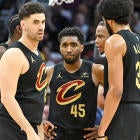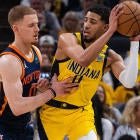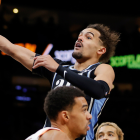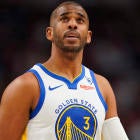The NBA Trade Deadline matters quite a bit this season. Sure, the odds of any team making a deal which vaults them into the Finals, or becomes the difference in beating the Warriors or not are slim, but expectations for this season could hinge on what deals teams are able to make.
For example, the Raptors are in a bit of a tailspin. They need a power forward to help regulate their defense and give them another weapon offensively to counter how defenses attack them. The Celtics are on a tear, but they know that if they want to get by Cleveland, they're going to need something extra. The Thunder are still poking around the league trying to find a small forward that can stabilize their offense, especially when Russell Westbrook isn't on the floor. The Knicks need to deal Carmelo Anthony. The pack of teams in the middle of the East are all headed in two directions at once.
Deals need to be made.
And yet, it's starting to seem more and more like there's not going to be much action at the deadline. Here's why.
THE PLUG
Every year there's a certain situation that holds up everything. Because no one wants to make a deal until that situation gets resolved. And it can hold up the deadline entirely. This happened with Orlando in 2012 with Dwight Howard. This year, there are multiple big components that could hold up the works: Carmelo Anthony and Jimmy Butler.
If teams believe those two are available, they may hold off on discussions in minor or lesser deals waiting to see what happens. And if negotiations go down to the wire, there may not be time to get those other deals done. There's a domino effect, but those dominoes are also on a time setting. Ironically, it's only if there's a league-wide sense that something will get done that it can stop the flow of transactions. There has to be a belief that something will happen in order to justify waiting on other decisions.
And those two players are in particularly sticky situations.
THE SITUATIONAL CONSTERNATION
The Bulls have put Butler out in the front window for sale and then yanked him out about six times over the past year. There are clear fissures between him and the front office, which have been present for a while. They nearly dealt him to Minnesota at the draft, before putting together this duct-taped monstrosity of mediocrity together.
And yet, even with Butler frustrated with management, irritated with coaching and generally displeased, a deal seems unlikely. Butler's a star player, and to get him you need a package that will blow the Bulls away. That's hard to put together. And on top of that, the Bulls, as HoopsHype points out, are not the easiest squad to swing a deal with:
With that said, one executive pointed out that the Bulls can be tough to negotiate with, add that if Chicago does decide make a trade, they would likely wait until just before the deadline to complete the deal. Another league source speculated that moving a face-of-the-franchise like Butler seems more like an offseason move than a mid-season one, but did add that a trade could happen if the right offer came along.
As Bulls fans have constantly pointed out, the team never makes a big move in the regular season, opting to make all their deals in the offseason. The Bulls are on a precipice as well, complicating matters even further. They're in seventh place in the East right now, a playoff team. Do you really pull the trigger on moving your marquee star when you can still make a run, and possibly reach a fourth or fifth seed?
Then there's the Knicks ... oh, the Knicks.
The Knicks continue to try and leak talks about Cleveland in a Carmelo Anthony deal. The Cavs, meanwhile, are leaking that they have no intentions of trading Kevin Love for Melo. This is pretty clearly an attempt by the Knicks to set a bar for Melo, one that they're not going to get. Melo's no-trade clause means he'll only go to the Cavs or the Clippers. Neither team will give them the return they need for a franchise star.
I'm pretty firmly on record questioning exactly what Anthony brings to your franchise from an impact perspective. He doesn't defend, is ball-dominant and high usage, typically opting for inherently inefficient shots, and has never, outside of Team USA, shown that he is willing to meld his game or sacrifice to make the team better. And yet, if the Knicks' options are keeping Anthony or dealing him for Jamal Crawford (which they reportedly won't do) and Austin Rivers, they need to keep him. He's more valuable as a sheer ticket draw than getting poor players in return.
If the Celtics are willing to part with almost anything for him, and Anthony's willing to go there, then sure, that deal makes sense. But it seems unlikely, with recent reports indicating that coach Brad Stevens likes Melo, but GM Danny Ainge isn't convinced. And Boston's riding too high right now to risk it.
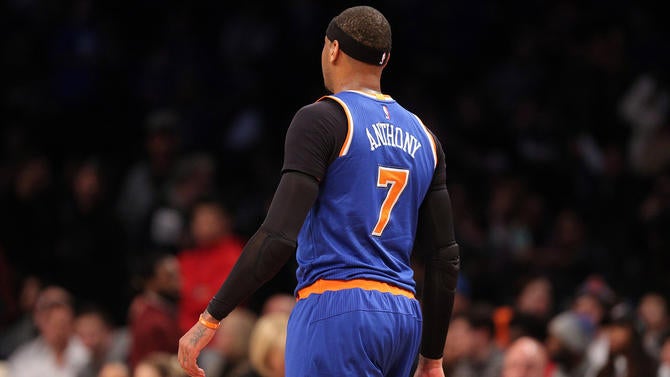
Speaking of the Celtics, they and the Raptors share a common problem: their assets are too good. Boston doesn't want to move Avery Bradley; he's shooting 41 percent from deep and is considered a top-flight perimeter defender. They don't want to move Jae Crowder; he's honestly been their second-best player on the team. They don't want to move Marcus Smart; his defensive versatility and playmaking have great upside over the next four years. They're not going to deal either of the Brooklyn Nets' picks they own; they can get a superstar with one of those picks (even if the stars in this year's draft are all point guards, the last thing they need).
Front office officials have consistently joked that trying to pull assets from Ainge is like pulling teeth, and now they have a legit reason to resist such overtures.
Then there's Toronto, which is spiraling out of control and whose need for a power forward upgrade is glaring. Yet Patrick Patterson is a helpful player who can hit from the outside. Terrence Ross has developed into a helpful wing with great athleticism. Jakob Poeltl looks like a serviceable NBA big. The team is still high on Bebe Nogueira. No one's going to be jumping up for Jonas Valanciunas to be the centerpiece in a deal; he's too inconsistent.
These situations are all across the league. There are no clear "open for business" teams, and the teams that need to make deals don't have any wares to peddle. Plus, we've seen the trade deadline decrease in its excitement the last few years anyway.
THE NEW BAD (FOR TRADE DEADLINES) DEAL
Since the 2011 CBA, we've seen a dramatic decrease in meaningful moves at the deadline. A lot of deck chairs on the Titanic have been moved around in late February, but few multi-team, actual impact deals have gone down. Part of that is how the new CBA restructured contracts. Deals are shorter now. Maxes went from six years to five for the same team, four for new teams. That had an impact on the other smaller deals, and now what used to be four-year deals are sometimes three or even two-year deals.
Now, teams are no longer locked into their cap sheets. Contracts are constantly coming off the books, and players are also entering free agency more often, which draws the question: If you can just wait and find other options in the summer, why give up assets now?
Then you've got the growing cap and how much space has been freed up with the new media deal. That will regulate itself over time as the new mega-deals chew up space, but for now, teams still have big expectations of their summers.
Granted, this line of thinking is flawed. Teams always believe they'll do better in free agency than they do, because players can only choose one team. So you wind up taking on big-money deals for mediocre players and talking yourself into them. But this is what teams do.
A QUIET FEBRUARY 23?
All of this suggests that we may not see much happen. Even teams like Phoenix are reluctant to deal its best players, like Eric Bledsoe. Even more so than in years past, teams are reluctant to deal their guys; they believe in their rosters.
That could make for a stagnant trade deadline. What does that mean? It means that not only will the title picture remain the same, which was going to be the case no matter what the moves were outside of a few crazy scenarios, but also that the playoffs will likely go the way we expect. The odds of a late-season run seem unlikely. There's some instability in the Eastern Conference -- neither Toronto nor Boston seem invincible in a playoff series against a good team peaking at the right time -- but there's also unlikely to be a dominant team outside of Cleveland to emerge.
What we see the league as right now, in the big picture, may be how the rest of this season goes. Don't hold your breath for a wild February.








